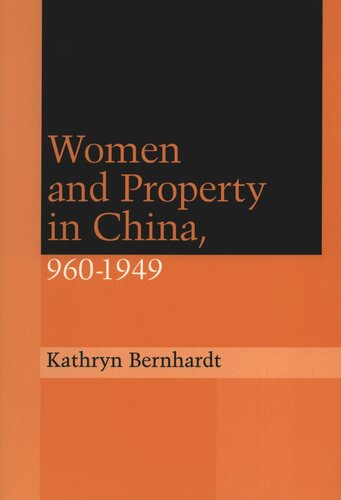

Most ebook files are in PDF format, so you can easily read them using various software such as Foxit Reader or directly on the Google Chrome browser.
Some ebook files are released by publishers in other formats such as .awz, .mobi, .epub, .fb2, etc. You may need to install specific software to read these formats on mobile/PC, such as Calibre.
Please read the tutorial at this link: https://ebookbell.com/faq
We offer FREE conversion to the popular formats you request; however, this may take some time. Therefore, right after payment, please email us, and we will try to provide the service as quickly as possible.
For some exceptional file formats or broken links (if any), please refrain from opening any disputes. Instead, email us first, and we will try to assist within a maximum of 6 hours.
EbookBell Team

5.0
50 reviewsPrevious scholarship has presented a static picture of property inheritance in China, mainly because it has focused primarily on men, whose rights changed little throughout the Imperial and Republican periods. However, when our focus shifts to women, a very different and dynamic picture emerges. Drawing on newly available archival case records, this book demonstrates that women’s rights to property changed substantially from the Song through the Qing dynasties, and even more dramatically under the Republican Civil Code of 1929-30. The consolidation in law of patrilineal succession in the Ming and Qing dynasties curtailed women’s claims, but the adoption of the Civil Code and the gradual dismantling of patrilineal succession in the twentieth century greatly strengthened women’s rights to inherit property. Through an examination of the changes in women’s claims, the author argues that we can discern larger changes in property rights in general. Previous scholarship assumed that patrilineal succession and household division were but different sides of the same coin—sons divided their father’s property equally as his patrilineal heirs. The focus on women, however, reveals that patrilineal succession and household division were, in fact, two separate processual and conceptual complexes with their own distinct histories. While household division changed little, patrilineal succession changed greatly. Imperial and Republican laws of inheritance, finally, were based on two radically different property logics, the full implications of which cannot be truly appreciated unless the two are examined in tandem.